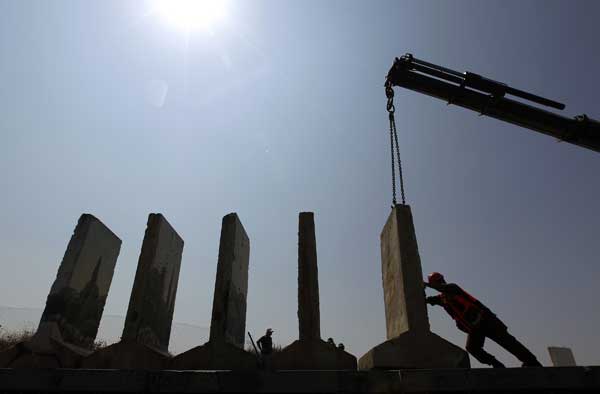Last-minute hitch before Palestinians, Israelis launch direct talks
A statement is anticipated any day now to announce the commencement of direct Israeli-Palestinian talks. However, the news initially expected as early as Sunday has been put on ice as the parties continue to argue about the terms of reference.
 |
|
A crane lifts part of a concrete barrier put up eight years ago to protect residents in Gilo, a Jewish settlement on land Israel captured in 1967, August 15, 2010. [Xinhua/Reuters Photo] |
Domestic consideration
The Jewish settlement issue is still on the way leading to the direct talks, as the Palestinians are reportedly insisting the statement stressing there be an Israeli settlement freeze in the West Bank and that a final deal be signed in two years.
Any linkage to the question of the settlements could prove extremely costly to Israeli Prime Minister Benjamin Netanyahu. His government is currently overseeing a building moratorium in the settlements but the 10-month period of that freeze will come to an end in September.
Netanyahu heads a hawkish coalition. While he has promised to be serious about reaching a peace deal that will see the creation of a Palestinian state, many of his cabinet colleagues view the matter very differently. This was made perfectly clear to the Israeli premier when his inner cabinet discussed the matter earlier this week. It is reported in the Hebrew press that four of the seven members of the panel favored a resumption of building on the Palestinian territory.
The Haaretz daily reported that two more-dovish ministers are calling for either a three-month extension to the freeze or permitting building work only in the largest settlements. It is widely assumed Israel will insist retaining after any peace deal.
It is precisely because of Netanyahu's domestic pressures that Palestinian President Mahmoud Abbas wants to receive guarantees before committing to any direct parley with Israel. For him the best-case scenario would be a formal Israeli commitment. Short of that, he would want the United States to make the guarantees.
While Washington takes the lead on the peace process, it is officially within the remit of the international peace Quartet. It is the Quartet -- Russia, the United Nations, European Union and the U.S. -- that will make any announcement on the commencement of direct talks.
The Palestinians want the wording of the Quartet's statement to match that of a similar document written in March. However, it is understood Washington is trying to alter the wording somewhat to placate Israel.
Go to Forum >>0 Comments
 Add your comments...
Add your comments...
- User Name Required
- Your Comment
- Racist, abusive and off-topic comments may be removed by the moderator.
 0
0 






